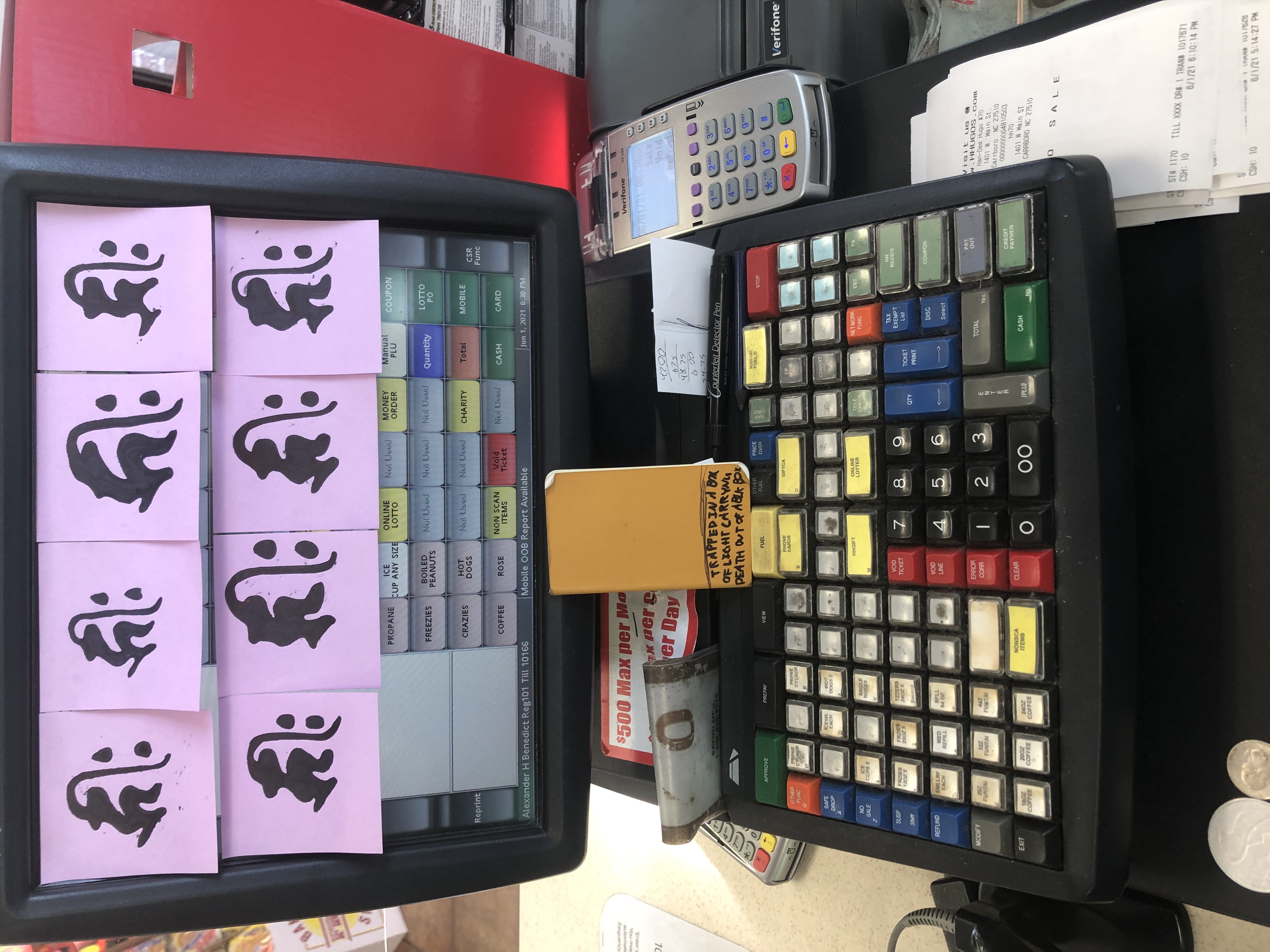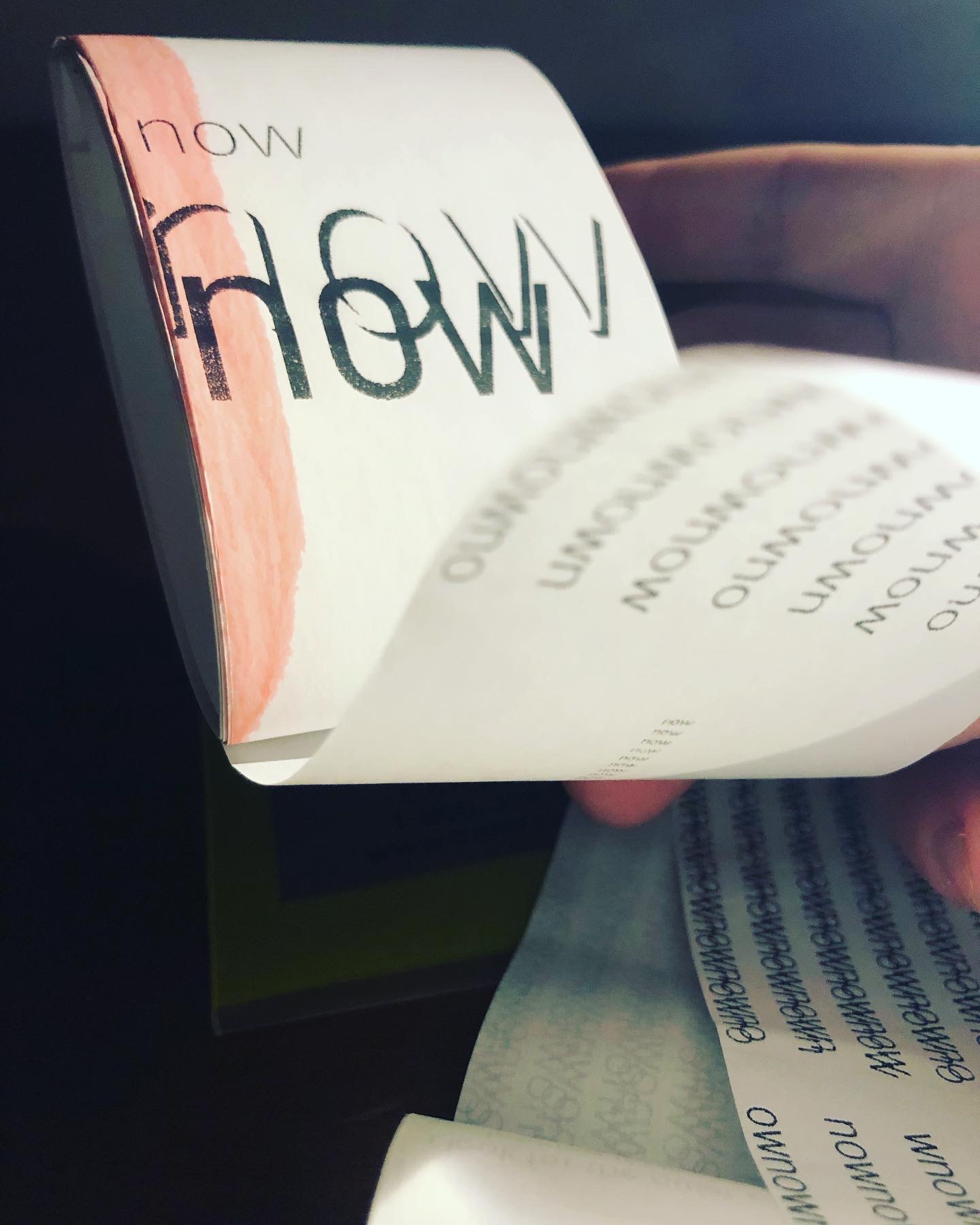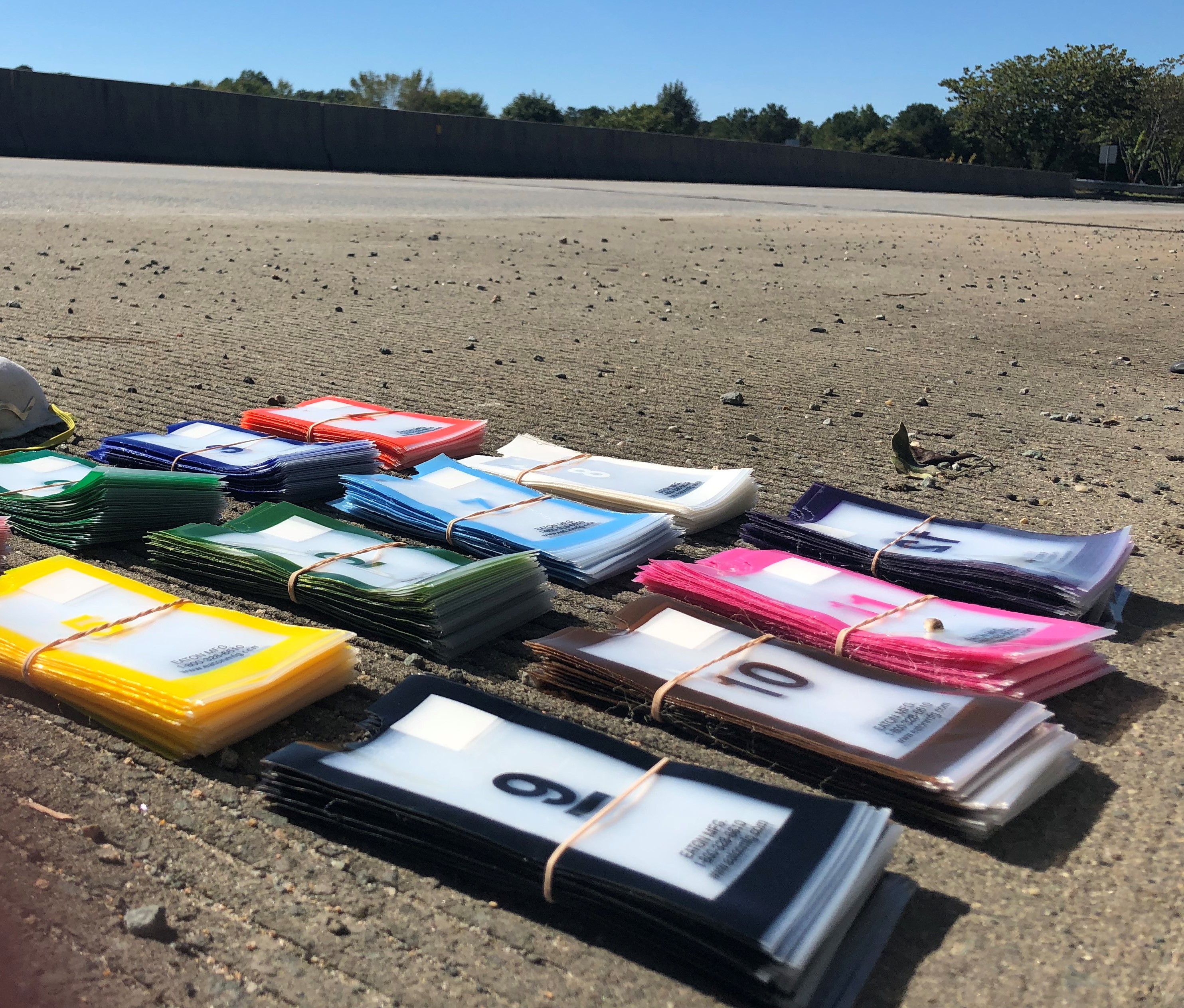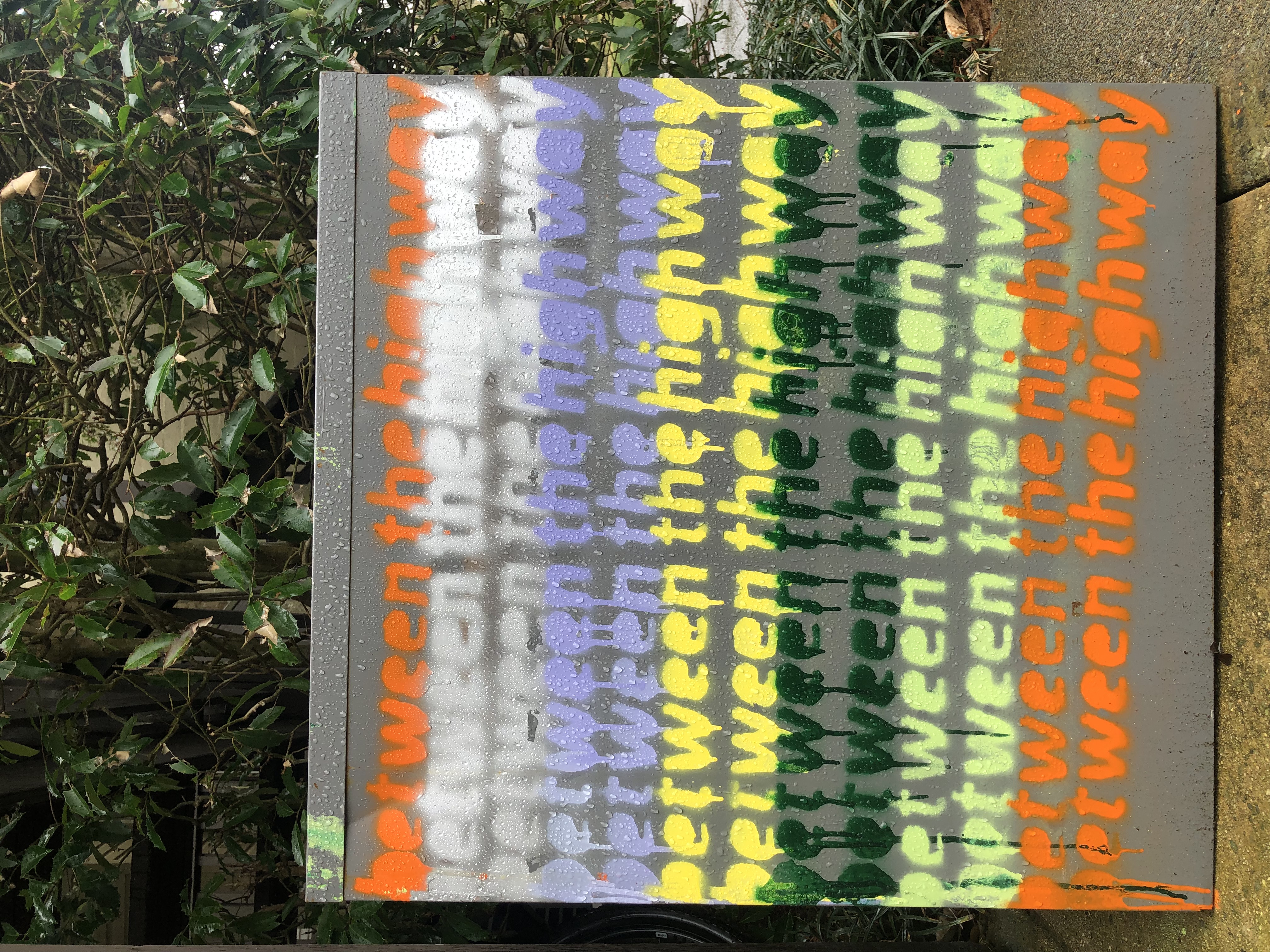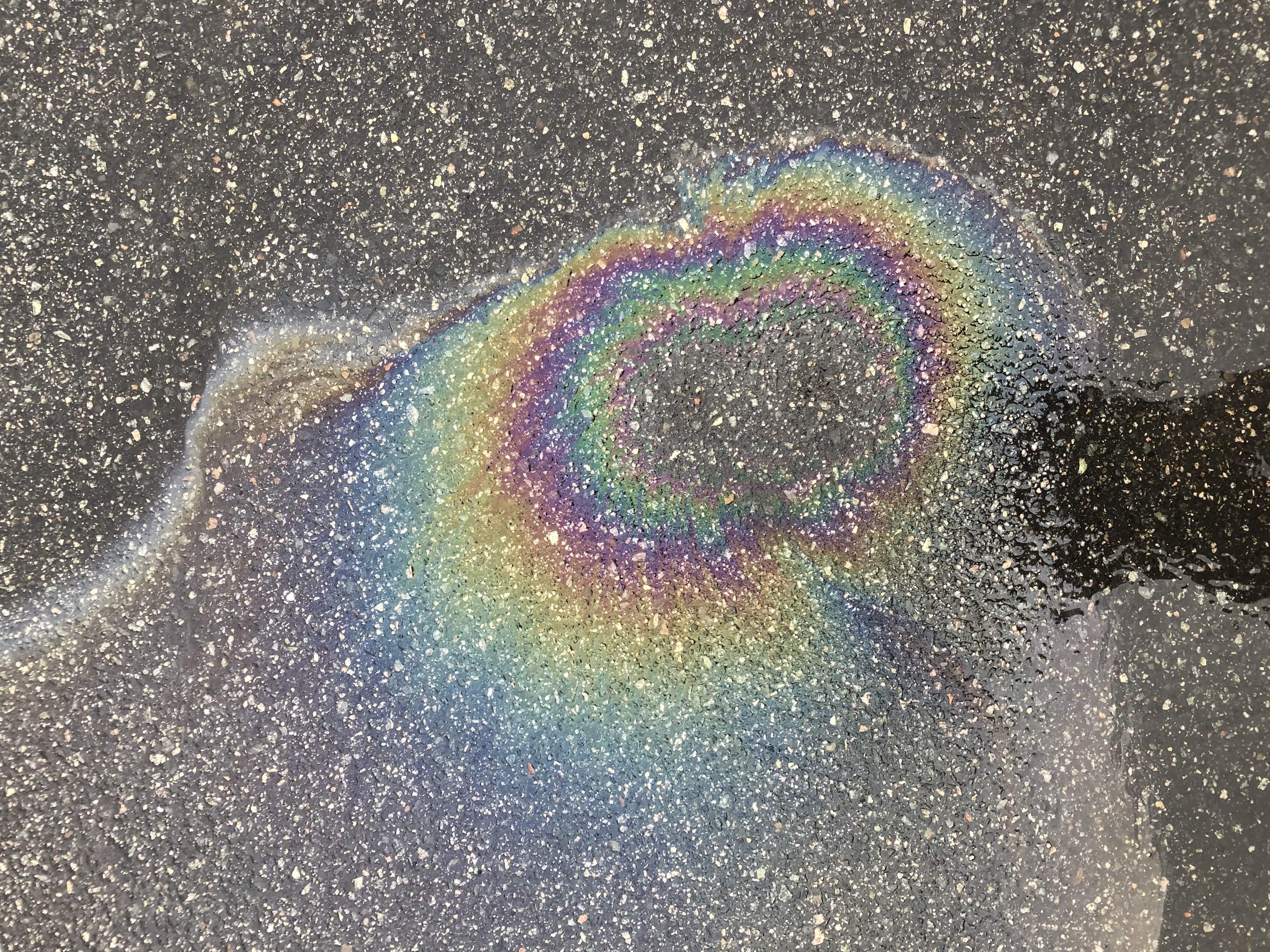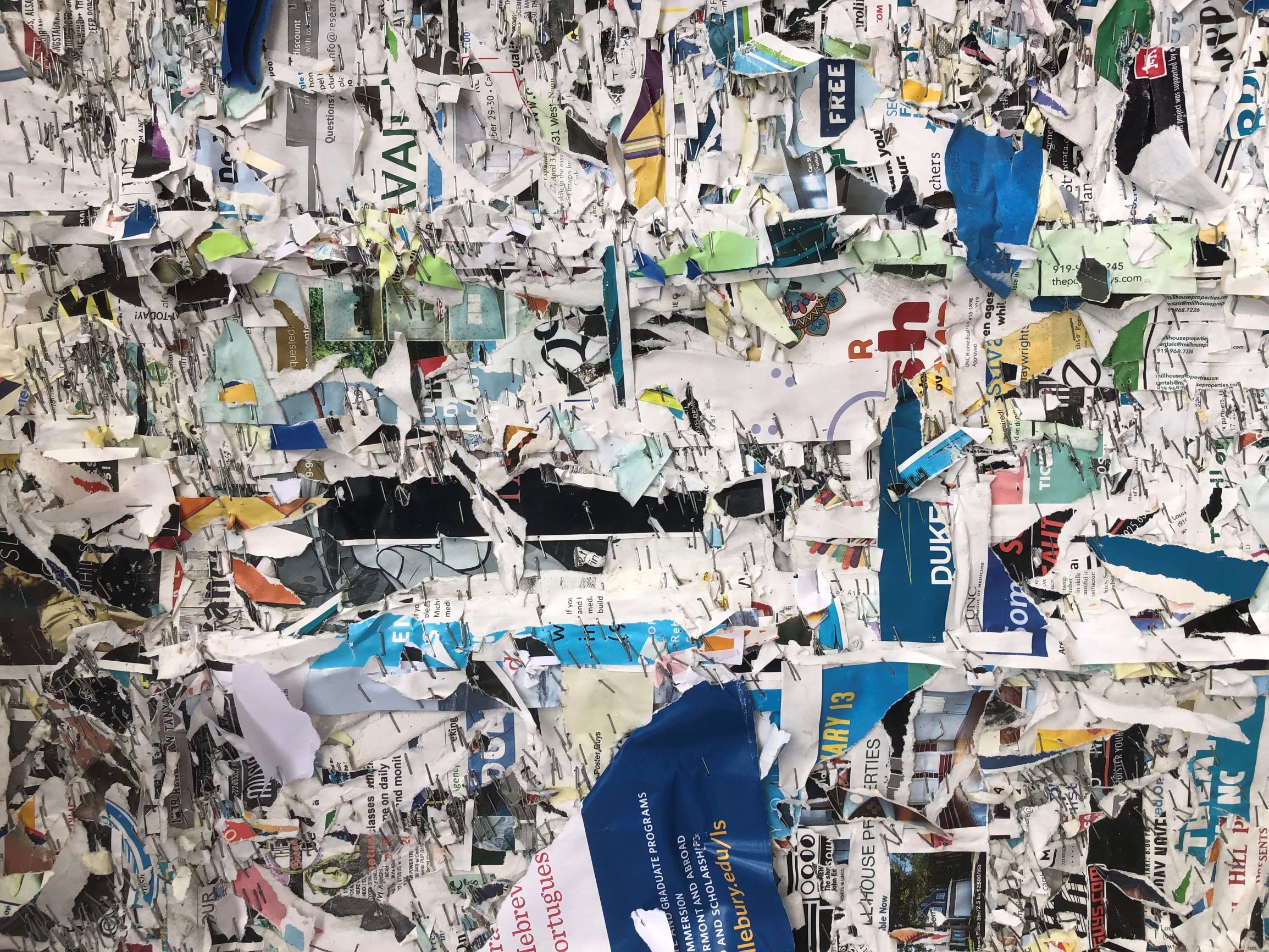
Ruth Jeffers
From
When Roads Dissolve
The first step is luck. A trusted gut. Up the
steps of the charter bus, I see Emad, sitting in the
middle of the back row. His black hair is shaved on
the sides, gelled on the top. His glasses bend toward
the book I’ve seen him reading: a black cover and
yellow Arabic script I can’t decipher. I pause, catch
my breath, then sit next to the window, his backpack
between us, and watch the desert whiz past. But
that’s the trick of the desert. It makes us think we
never move. It pulls us into the sand, intent on
fossilizing our memories.
He looks up from his book and looks at me. We
resume the conversation we’ve been having on
Thursdays during class, a Muslim Palestinian and
an ex-Christian American, reading the Jewish Bible
on an Israeli kibbutz. He’s been leaning toward me
when we sit together on the grass.
“So how do you know that you believe in God?”
“I didn’t until I was fifteen. My parents were Muslim,
but I didn’t accept it until I went to Mecca and saw
the Kabba for myself. That’s when I really believed
in God.”
“But... what exactly is it that you believe in?”
“It’s God, Ruth. The creator. You can sense him.”
“I can’t. I stopped believing when I was seventeen.
The opposite of your story. I wish I believed, but
I don’t.”
Off the bus. I float in the Dead Sea, while he reads
on the sand. On the bus. He moves his backpack to
the middle seat and sits beside me. Off the bus. We
peer into sinkholes. Israel diverts so much water from
the Sea of Galilee that it has little to give the Jordan
River, the artery connecting the seas. The Dead Sea
is drying, and the fresh groundwater is approaching,
dissolving the blocks of salt in the earth, carving
craters next to the highway. On the bus, driving toward
Hebron, his home. When we reach a checkpoint, he
leans into me, showing me the map on his phone.
“We’ve already been in the West Bank for a few minutes,
see? But the checkpoints are farther in than the border.
We are in occupied land, and most people on this bus
wouldn’t even know it.”
Off the bus. Wind rips through our hair atop a mountain,
the Dead Sea beneath us, dark blue against the dusty
Jordanian mountains. The sides of our bodies press
together, arms holding each other’s heat inside.
On the bus. The sun goes down. In the darkness, we
curl up under a blanket, green and purple with leopard
stripes. Once he tells me he is colorblind, I forgive
this choice. I lean into his shoulder. His hand enfolds
mine, and his thumb massages every crease.
In the back of the bus, pillars of salt dissolve as we
rush through the darkness.
—
THIS ROAD LEADS TO AREA “A”
UNDER THE PALESTINIAN AUTHORITY
THE ENTRANCE FOR ISRAELI
CITIZENS IS FORBIDDEN,
DANGEROUS TO YOUR LIVES
AND IS AGAINST THE ISRAELI LAW
—
This red sign commands us in white letters: Hebrew,
then Arabic, then English. I’ve seen it before,
guarding the entrance to Bethlehem, as it does every
Palestinian city in the West Bank. We watch it shrink
through the back window as Mohammed drives away
from Ramallah, toward green and stony hills. He talks
to us through the mirror, his sideburns and short beard
perfectly angled, a temporary father to his curious
American friends.
“The cities are all Area A,” Mohammed says. “Even
though they’re under Palestinian control, the Israeli
army still raids us all the time. Area C is under total
Israeli control. That’s where we are now.”
The shift from Areas A to C is immediate. The road
signs in Area C are identical to those inside Israel:
white block arrows with black trim pointing toward
Ramallah behind us and Nablus to the north, always
in Hebrew, then Arabic, then English. Israeli flags
decorate bus stops, street lights, and the gates
enclosing Israeli settlements. Their red roofs are
missing the black water tanks that pepper the tops
of Palestinian homes. The settlements are connected
to the water lines, who draw saltless water from the
desalination plants. Palestinians call it apartheid when
they drink from water tanks and Israeli settlers drink
from water lines that run through occupied land. Israel
shakes the accusation off, calling these hills “disputed
territory” while the Hebrew signs, Israeli flags, and red
roofs transfigure the trees and rocks into another Israel.
“Palestinians live in Area C,” Mohammed tells us
as we drive beneath an Israeli settlement sitting
on top of a hill. “But we cannot build in our villages
without permits from Israel. And of course, they
never give us permits. So we build anyway and
wait for the bulldozers.”
He points out each settlement as we drive along the
road to Nablus, his hometown. They sit on the green
hills overlooking the segregated roads. Construction
begins. Mohammed says, “They’re building an overpass
for settlers to use so they don’t have to drive on the
road with Palestinians. It’ll skip all the traffic between
Ramallah and Nablus, but you can’t drive on it with a
Palestinian license plate.” Yellow plates will speed
across disputed territory, while white plates will stall
on occupied land.
Along the road where Palestinians are permitted,
soldiers patrol a guard post. They are decked in full
combat gear, all carrying M-16s, barely twenty years
old. One soldier has set his gun on the ledge of the
post so it points at the cars. His comrade jeers at
Mohammed, amused by the presence of four light-
skinned women in his car. One eye looks down the
barrel of the gun, fixing on Mohammed’s body,
pivoting inch by inch to follow Mohammed as he
drives around a traffic circle, his eyes set ahead.
The bullet radiates potential energy. It could fly from
an Israeli hand to a Palestinian heart and it wouldn’t
be called apartheid beneath the Israeli flag drooping
in the dry heat.
—
Every pub party is the same flashing disco ball, same
pounding beat of Hebrew and Arabic pop and
American hits from the last three decades. My bare
feet step in sticky puddles of water splashing from
the fountain into spilled cocktails. Emad wipes his
mouth after drinking from the fountain when he sees
me. We pass as I reach for a drink of water, and he
put his hands on my waist. I step into him. We look
into each other’s eyes, then lips, and kiss as technicolor
lights flash around us and dance music blasts from
the speakers. We do not do this in public, but we forget
for a moment. When we smile into each other’s eyes,
the happiness of many impossible years compresses
into this single moment, a golden orb I tuck into God’s
pocket. I will pull it out and hold it in my hand when
the lights stop flashing and the music fades into the
sound of my breaths, rising and falling, with only
the moon left to breathe beside me.
I dance all night, barefoot, with the spine of a desert
plant stuck in my big toe. It lodged itself beside the
nail during a desert walk in open-toed shoes. I don’t
notice the pulsing red pain until a few days after the
party, once I return to the kibbutz from a weekend in
Tel Aviv. I thought I had pulled it all out, but the desert
plants know how to persist, surviving on little to no
water for most of the year.
Emad lays me down on his bed in the afternoon and
props my foot on a pillow. He is a doctor, and I am
his patient. He will heal me.
He squats to put my foot on his eye level,
pressing around the red area.
“Does this hurt?”
“A little bit.”
“Here?”
“Yes.”
“Here?”
“Jesus, that hurts.”
As I clench my fists and squeeze salt out of my eyes,
Emad coaxes the rest of the spine out of my toe, his
eyes totally absorbed in the procedure.
“Here it is,” he holds the white spine in between
his fingers, like a toothpick snapped in half.
“That’s all of it, inshallah.”
“I can’t believe I walked all over Tel Aviv with that
in my toe.”
“I can’t believe you’re still wearing sandals in the
desert, habibti. Walking around like a fucking
Israeli. Next time, don’t try to pull it out with your
hands, tayeb?”
“Tayeb.” I return his tired smile, knowing that I will
continue wearing Chacos in the desert. Another
spine will puncture my toe on another walk, and I
will pull it out with my fingers again. Maybe I will
heal myself this time, or maybe it will snap again,
leaving a sliver inside my body for Emad to find.
When Roads Dissolve
The first step is luck. A trusted gut. Up the
steps of the charter bus, I see Emad, sitting in the
middle of the back row. His black hair is shaved on
the sides, gelled on the top. His glasses bend toward
the book I’ve seen him reading: a black cover and
yellow Arabic script I can’t decipher. I pause, catch
my breath, then sit next to the window, his backpack
between us, and watch the desert whiz past. But
that’s the trick of the desert. It makes us think we
never move. It pulls us into the sand, intent on
fossilizing our memories.
He looks up from his book and looks at me. We
resume the conversation we’ve been having on
Thursdays during class, a Muslim Palestinian and
an ex-Christian American, reading the Jewish Bible
on an Israeli kibbutz. He’s been leaning toward me
when we sit together on the grass.
“So how do you know that you believe in God?”
“I didn’t until I was fifteen. My parents were Muslim,
but I didn’t accept it until I went to Mecca and saw
the Kabba for myself. That’s when I really believed
in God.”
“But... what exactly is it that you believe in?”
“It’s God, Ruth. The creator. You can sense him.”
“I can’t. I stopped believing when I was seventeen.
The opposite of your story. I wish I believed, but
I don’t.”
Off the bus. I float in the Dead Sea, while he reads
on the sand. On the bus. He moves his backpack to
the middle seat and sits beside me. Off the bus. We
peer into sinkholes. Israel diverts so much water from
the Sea of Galilee that it has little to give the Jordan
River, the artery connecting the seas. The Dead Sea
is drying, and the fresh groundwater is approaching,
dissolving the blocks of salt in the earth, carving
craters next to the highway. On the bus, driving toward
Hebron, his home. When we reach a checkpoint, he
leans into me, showing me the map on his phone.
“We’ve already been in the West Bank for a few minutes,
see? But the checkpoints are farther in than the border.
We are in occupied land, and most people on this bus
wouldn’t even know it.”
Off the bus. Wind rips through our hair atop a mountain,
the Dead Sea beneath us, dark blue against the dusty
Jordanian mountains. The sides of our bodies press
together, arms holding each other’s heat inside.
On the bus. The sun goes down. In the darkness, we
curl up under a blanket, green and purple with leopard
stripes. Once he tells me he is colorblind, I forgive
this choice. I lean into his shoulder. His hand enfolds
mine, and his thumb massages every crease.
In the back of the bus, pillars of salt dissolve as we
rush through the darkness.
—
THIS ROAD LEADS TO AREA “A”
UNDER THE PALESTINIAN AUTHORITY
THE ENTRANCE FOR ISRAELI
CITIZENS IS FORBIDDEN,
DANGEROUS TO YOUR LIVES
AND IS AGAINST THE ISRAELI LAW
—
This red sign commands us in white letters: Hebrew,
then Arabic, then English. I’ve seen it before,
guarding the entrance to Bethlehem, as it does every
Palestinian city in the West Bank. We watch it shrink
through the back window as Mohammed drives away
from Ramallah, toward green and stony hills. He talks
to us through the mirror, his sideburns and short beard
perfectly angled, a temporary father to his curious
American friends.
“The cities are all Area A,” Mohammed says. “Even
though they’re under Palestinian control, the Israeli
army still raids us all the time. Area C is under total
Israeli control. That’s where we are now.”
The shift from Areas A to C is immediate. The road
signs in Area C are identical to those inside Israel:
white block arrows with black trim pointing toward
Ramallah behind us and Nablus to the north, always
in Hebrew, then Arabic, then English. Israeli flags
decorate bus stops, street lights, and the gates
enclosing Israeli settlements. Their red roofs are
missing the black water tanks that pepper the tops
of Palestinian homes. The settlements are connected
to the water lines, who draw saltless water from the
desalination plants. Palestinians call it apartheid when
they drink from water tanks and Israeli settlers drink
from water lines that run through occupied land. Israel
shakes the accusation off, calling these hills “disputed
territory” while the Hebrew signs, Israeli flags, and red
roofs transfigure the trees and rocks into another Israel.
“Palestinians live in Area C,” Mohammed tells us
as we drive beneath an Israeli settlement sitting
on top of a hill. “But we cannot build in our villages
without permits from Israel. And of course, they
never give us permits. So we build anyway and
wait for the bulldozers.”
He points out each settlement as we drive along the
road to Nablus, his hometown. They sit on the green
hills overlooking the segregated roads. Construction
begins. Mohammed says, “They’re building an overpass
for settlers to use so they don’t have to drive on the
road with Palestinians. It’ll skip all the traffic between
Ramallah and Nablus, but you can’t drive on it with a
Palestinian license plate.” Yellow plates will speed
across disputed territory, while white plates will stall
on occupied land.
Along the road where Palestinians are permitted,
soldiers patrol a guard post. They are decked in full
combat gear, all carrying M-16s, barely twenty years
old. One soldier has set his gun on the ledge of the
post so it points at the cars. His comrade jeers at
Mohammed, amused by the presence of four light-
skinned women in his car. One eye looks down the
barrel of the gun, fixing on Mohammed’s body,
pivoting inch by inch to follow Mohammed as he
drives around a traffic circle, his eyes set ahead.
The bullet radiates potential energy. It could fly from
an Israeli hand to a Palestinian heart and it wouldn’t
be called apartheid beneath the Israeli flag drooping
in the dry heat.
—
Every pub party is the same flashing disco ball, same
pounding beat of Hebrew and Arabic pop and
American hits from the last three decades. My bare
feet step in sticky puddles of water splashing from
the fountain into spilled cocktails. Emad wipes his
mouth after drinking from the fountain when he sees
me. We pass as I reach for a drink of water, and he
put his hands on my waist. I step into him. We look
into each other’s eyes, then lips, and kiss as technicolor
lights flash around us and dance music blasts from
the speakers. We do not do this in public, but we forget
for a moment. When we smile into each other’s eyes,
the happiness of many impossible years compresses
into this single moment, a golden orb I tuck into God’s
pocket. I will pull it out and hold it in my hand when
the lights stop flashing and the music fades into the
sound of my breaths, rising and falling, with only
the moon left to breathe beside me.
I dance all night, barefoot, with the spine of a desert
plant stuck in my big toe. It lodged itself beside the
nail during a desert walk in open-toed shoes. I don’t
notice the pulsing red pain until a few days after the
party, once I return to the kibbutz from a weekend in
Tel Aviv. I thought I had pulled it all out, but the desert
plants know how to persist, surviving on little to no
water for most of the year.
Emad lays me down on his bed in the afternoon and
props my foot on a pillow. He is a doctor, and I am
his patient. He will heal me.
He squats to put my foot on his eye level,
pressing around the red area.
“Does this hurt?”
“A little bit.”
“Here?”
“Yes.”
“Here?”
“Jesus, that hurts.”
As I clench my fists and squeeze salt out of my eyes,
Emad coaxes the rest of the spine out of my toe, his
eyes totally absorbed in the procedure.
“Here it is,” he holds the white spine in between
his fingers, like a toothpick snapped in half.
“That’s all of it, inshallah.”
“I can’t believe I walked all over Tel Aviv with that
in my toe.”
“I can’t believe you’re still wearing sandals in the
desert, habibti. Walking around like a fucking
Israeli. Next time, don’t try to pull it out with your
hands, tayeb?”
“Tayeb.” I return his tired smile, knowing that I will
continue wearing Chacos in the desert. Another
spine will puncture my toe on another walk, and I
will pull it out with my fingers again. Maybe I will
heal myself this time, or maybe it will snap again,
leaving a sliver inside my body for Emad to find.
